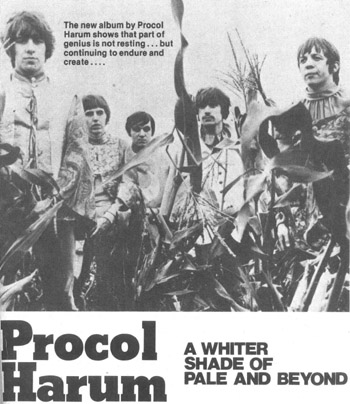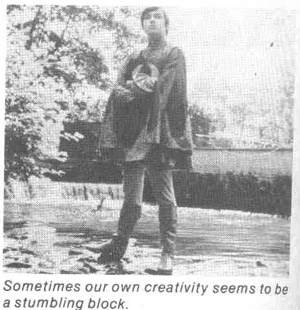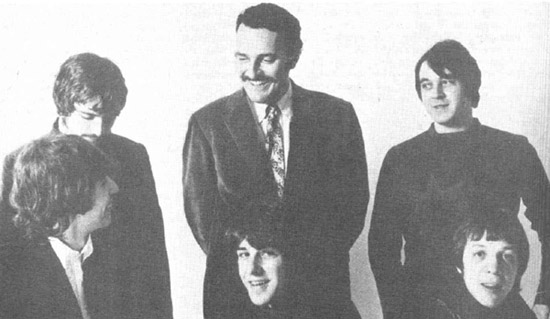Procol HarumBeyond |
|
|
PH on stage | PH on record | PH in print | BtP features | What's new | Interact with BtP | For sale | Site search | Home |
|
The date: May 15th, 1967. The first Procol Harum record is released. The occasion is marked by a private celebration in the minds of the musicians named Brooker, Reid, Fisher, Royer, Knights and Eyden. Together under a name that translates from the Latin as "beyond these things," they hope their fusion of classical-rock will find favor.

Ten years later Procol Harum celebrates their anniversary with a live concert at New York's Palladium Theater. A cake arrives from Warner Brothers and Gary Brooker blows out the candles. "It was nice gesture. Didn't expect it. Probably don't deserve it - and I certainly won't eat it. Not if it has cream on."
It's been ten years since Whiter Shade of Pale sold 2.5 million copies in the summer of 1967. And yet, at this "birthday concert," it is made powerfully clear that Procol has done more than endure. The old songs have the freshness of classics, and the new ones continue to be fulfilling and innovative. All are brought to life with a new-found fullness. The rock numbers are thunderous. The slow numbers are majestic.
The band has been accused of being rather static in their live shows, meaning that instead of tearing off their shirts and strutting, they concentrate on their music. In their latest incarnation (Pete Solley, formerly of Chris Farlowe and Fox is the permanent organist, Chris Copping moving to bass) Procol achieves a new level of intensity. Solley's organ and synthesizer add richness and texture. Mick Grabham has stepped in with a muscular lead guitar and at opposite ends of the stage, BJ Wilson and Gary Brooker present drum and piano counterpoint. The result is solid sound with Brooker's incredible, soaring vocals rising up from within.
At the concert, Dee Murray (long a sideman for Elton John) stepped in for Chris Copping on bass. According to Keith Reid, it's a temporary arrangement.
The Procol Harum audience mirrors the decorum of the group. Although they could be driven into standing ecstasy over the first thunderous line of Simple Sister or the five-minute drum blitz Wilson delivered during Unquiet Zone, they were drawn into the quiet electricity that built with every perfectly-wrought number. For cultists, it was a time for communion, to become lost in the intense corridors of sound, not to scream hopelessly at idols on stage.
The program reflected the 10th Anniversary theme. They dug up Wishing [sic] Well and performed a blistering, stomping version of The Devil Came from Kansas. Through a thousand plays, A Salty Dog retained its drama. "The things we do, do stand up to time," Keith Reid says. "And I guess for the truly great people their greatness comes from the fact that their work is as enjoyable in five years' time as it was when it was created."
Reid was along on the tour, as always, as the principal overseer and road manager. During the rehearsal he kept a watchful eye on the procedure while Pete Solley was lost in the tuning of his synthesizer and BJ Wilson took a few casual smokes. Gary Brooker appeared the essence of British manner, thoughtfully smoking his pipe as he experimented with the array of keyboards. A transformation occurred when Keith Reid took his position in the center of the empty theater and the band suddenly burst into a blaze of symphonic chords and then a hard driving version of Conquistador and Wizard Man. Even though it was a supposedly relaxed rehearsal, Brooker chose to sing the war horse, Salty Dog. It was several hours later before Procol Harum had set the instruments up to their liking.
In honor of New York, or "The Big Lemon" (as Brooker puts it with a wry twist), the band performed The Unquiet Zone as a symbol of 42nd Street. Mark of the Claw was described as "a dreadful obscenity discovered in Central Park" - a dark tale of an unnamed crime in which the prisoner was freed through a fateful miscarriage of justice. The song was written by Reid and lead guitarist Mick Graham [sic]. Graham's [ sic] brilliant contribution as a composer solidifies his identity with the group. It was the closing number, a stunning example of Procol's powerful, synthesized sound.
The five encores gave the group a chance to play around with a few oldies. The fun and games, usually reserved for Grand Hotel, which loosens up into a potpourri of old tin pan alley songs and flamenco variations, came to the fore with a Procol Harumized Jambalaya. After the ageless Homburg and the explosive Nothing But the Truth came the benediction - Whiter Shade of Pale.
Procol's concert was a salute to the past in addition to the unveiling of songs from the new album. Procol's tenth, Something Magic, emphasizes the piano, organ and synthesizer. Pete Solley has integrated into the group quickly, enhancing old numbers and creating innovations in the new. He solos on the eerie, undulating Strangers in Space and careens through Mark of the Claw with sirens, warps and howls. The album also includes Procol's most adventurous number since the suite on Shine on Brightly. An entire side is devoted to the allegory, The Worm and the Tree, narrated by Brooker and told by the music.
As Procol Harum explored their ten years by the soul-satisfying New York concert, it might do well to take brief look back at the ten years of Procol Harum records.
"I thought all the songs on the first album were fantastic," Keith Reid has said of the 1967 album simply called Procol Harum. "It was the worst-recorded album, but I like the excitement of it." By the time the first LP was getting ready for the studio, the group already started a personnel shift. The core was there in lyricist Keith Reid, lead singer Gary Brooker and organist Matthew Fisher. During the rush to get the album out, Robin Trower joined on lead guitar, with BJ Wilson on drums. Few groups possess such a line-up of individual stars.

Despite its empty mono sound, Procol Harum remains a sentimental favorite for many. Fisher's classical organ dominates but A Christmas Camel demonstrates Brooker's pounding piano and vocal capacities. Most of the songs are portraits of youthful insecurity and depression - subjects befitting band members whose average age was 18 [sic]. Death obsessions reach bizarre proportions in Something Following Me, but the grapplings with the unknown and the verbalization of fear yields comfort. On Salad Days it finds a simile in peaches "snuggled closer down into the clotted cream."
The album immediately placed the group in the vanguard of the new move toward literate rock. It was favorably compared to the astonishing Sergeant Pepper.
Shine on Brightly was Procol Harum's first real stereo album, recorded over a long period of time and with great care. Reid's lyrics continued to dwell on the unseen, describing a level of optimism obtainable from acknowledging mystery and helplessness ("my befuddled brain shines on brightly, quite insane"). Robin Trower's screaming guitar became a potent force while BJ Wilson emerged as one of rock's most skilled and imaginative drummers. In Held 'Twas In I was an innovation for its time, a brilliant suite of interconnected songs simmering with gothic bass, bursts of guitar licks, smoldering organ and mystical recitation, vocals and sound effects.
Brooker recalled "All the ideas were there, but the suite wasn't complete when recording started. We didn't know what was going to happen. When it was finally finished we listened to it for the first time at night. It was tremendous."
"Sometimes our own creativity seems to be a stumbling block," Reid adds. "Shine on Brightly came out at a time when no one understood or appreciated it. Yet now I have people talking to me about it like we had just released it."
The third album, A Salty Dog, turned out to be one of the group's most accessible, best selling efforts. The title cut came not from the sea, but from Cleveland. The inspiration was a wood carving in [a?] bar with the words "Great God, Skipper, we done run aground." Like Dylan, Reid has the habit of forcing a rhyme here and there. Somehow he avoids embarrassment and on Salty Dog he actually rhymes "moon" and "June" and gets away with it.
After the album was completed, producer-writer-singer Matthew Fisher went off on his own. He produced Prairie Madness for Columbia and recorded two albums of his own for RCA, filled with beautiful organ solos and lyrics loaded with bruised feelings.
Some songs deal bitterly with back-stabbers ("Once I thought I had good friends but now I know they lied ... do they believe God made me so that they could rob me blind?"), and others describe painful searches for direction. There are a number of wistful, sad ballads of lingering love for women who no longer feel a similar need. The sweetness turned sour, the warmth turned cold and the only question to be asked is, "Where did I go wrong, you know I loved you for so long ..." In between the songs of cozy self pity and withdrawal are instrumentals, occasional vengeful rockers and lines that indicate that the withdrawal is temporary, and that Fisher will take up the challenges once more.
Meanwhile, back at the turn of the 70s, Procol Harum found Chris Copping to replace Fisher on organ - and David Knights on bass as well. Copping had played with Gary Brooker when the two were members of the Paramounts in 1966 [sic].

The group's sound shifted immediately from the organ/piano axis to Robin Trower's lead guitar. He had been gaining confidence and stepped into the spotlight for the next two albums, Home and Broken Barricades.
Home featured hard, Trower classics like Whisky Train and the vicious Still There'll Be More ("I'll blacken your Christmas and piss on your door"). The mini-epic Whaling Stories was aboard on [an?] album flooded with images of water. Not just the numbing whisky or the salty insult of a pissed-on door. There were "streets awash with blood and pus," "boiling oil and shrieking steam," the fear of losing faith and drowning in an unswimmable river (Your Own Choice) and the demand "wash yourself and see your sorrow" in ritual cleansing.
But in the end, all that was left was described in Broken Barricades: "The oceans have ravished and strangled the land. Waste fills the temples. Dead daughters are born. The presses are empty. The editors torn." Sandwiched in between sparks of fury in the decay, power failures and Simple Sister were necrophiliac love songs like Playmate of the Month [sic] and Luskus Delph the later [latter?] of which Brooker often introduced as "a bit of sultry, underhanded smut," with lyrics viscously bubbling with heated sexual imagery.
About this time Keith Reid defended what some critics took to be an excessively morbid outlook by saying, "I have no bleak attitude. I'm not on a death trip. It's realism. The thing is, it doesn't matter how horrific anything is - that doesn't make it negative. Anything that's truthfully happening is positive." He stressed truth in art, as so many serious poets have done before him.
Broken Barricades sold 150,000 copies. Trower's departure may have been amicable but it was also a strain. "When you get a situation where one person wants to be everything," a band member said in an interview, "or he thinks he's great at everything, because he's great at one thing - well, some people don't want to be just as good as they are. They want to be as good as someone - and wind up being someone else."
Trower successfully became Jimi Hendrix. His first two Chrysalis albums were acclaimed big sellers, but after a while critics were charging repetition and Trower's bright star began to dim. Around this time Gary Brooker demonstrated his own independence by joining the stars who sat in on George Harrison's All Things Must Pass set.
Musically, Procol Harum has always been split between hard rock and classical rock. Although the two can often be combined into a brilliant fusion, the albums seem to lean toward one extreme or the other in concept. After Trower's departure, Procol Harum turned around completely with the Live with the Edmonton Orchestra album, a full-blown symphonic exercise released in the winter of 1972.
Five years after Whiter Shade of Pale the group had an unexpected hit single with Conquistador (ironically first recorded in 1967). With bold brass and violin'd [?] percussion, it went gold and Procol Harum's new-found mass appeal allowed them the leverage to join Warner Brothers and get a bigger working budget to explore their classical-rock experiments.
The result was a peak triumph. Grand Hotel was an exquisite blend of elegant classicism wired with the gut of rock. It drew instant critical acclaim. Warners did some effective promotion and the attractive album (which included a glossy book of lyrics and illustrations) remained in Billboard's Top 100 for five months. The group's lineup had undergone a shift that was not immediately evident. Dave Ball, who had duped Robin Trower's work for the live album, was replaced by Mick Grabham.
In a letter to writer Bruce Pollack, Keith Reid explained his method of writing: "It's something like the construction of a jigsaw puzzle without knowing what the finished product will be. I start off with one or two pieces, ie a phrase (Grand Hotel) or fragments of a concept (love which has burnt itself out and turned into feuding and bitterness, as in Fires Which Burnt Brightly). Then, by interlocking pieces, I build up a picture that makes sense and conveys my thoughts and meaning."

"Originally, I made a pattern - a theme of work, or a story, but over the years I have come to reject the use of words for themselves alone. Theme and story line have become more important. My work has become simplified. I cut away as much fat as possible and try to leave the bare bones. "
The paring down of lyrics can be seen, in perfect textbook example, in Toujours L'Amour. The harried logic of a bewildered, pained and lost lover are caught in quick flashes: "She took all the pleasure and none of the pain. All of the credit and none of the blame." The short, gut punches build: "She grew thin - and I grew fat. She left me and that was that." It reaches what appears to be a logical conclusion: "Maybe I 'll take an excursion to Spain. Buy a revolver. Blow out my brain."
Bringing Home the Bacon was full-powered rocker, as grisly and hateful a nursery rhyme as Simple Sister was. Fires Which Burnt Brightly and the title cut were powerful classical rock fusions.
Despite the 17th century artwork on the cover, 1974's Exotic Birds and Fruit represented a sudden shift back to hard rock. "The Edmonton album was just an attempt to try something different and we carried it over to Grand Hotel," Keith Reid explained. "On this album we tried to dispel that symphonic image."
As a return to roots, the album is almost a mirror of their very first release. The musical patterns match when Fresh Fruit is compared to Mabel, New Lamps for Old to Whiter Shade of Pale, Butterfly Boys to Kaleidoscope. No lyric booklet appeared with this or the subsequent hard rocker Procol's Ninth [ apparently US pressings lacked the lyric-insert we had in Europe], but Reid's lyrics were nevertheless deserving of their royal treatment.
Reid's lyrics on songs like Nothing But the Truth and Strong as Samson were more universal than introspective. More fierce than resigned, they railed against the oppression of spirit caused more by political and social evils than any personal imp of the perverse.
The ninth album, released in April of 1975, was their hardest rock album, produced by Jerry Leiber and Mike Stoller. Brooker, a fan of R&B from way back, got a chance to demonstrate what he could do with an oldie like I Keep Forgetting, a number with all the makings of a smash single. If there was any theme running through the album, it was Reid's reappraisal of his writing. Heroic self-pity was raised to a fine art on Fool's Gold ("I was trying hard to win, save the world and be the king ... I was locked in bitter strife, fighting monsters all of my life"). The battle to put words on paper (Without a Doubt) led to Typewriter Torment ("it eats up your life like a dose of the clap"). The album ends with a lifeless rendition of Eight Days a Week, which seemed to have been done purposely - resigned to robot-rock instead of more difficult, gut-wrenching original, the band mocks a lyrically vacuous hit song, the easy way out.
The ironic juxtaposition of Typewriter Torment to Eight Days a Week didn't mean that Reid was giving up. The new album, produced by Procol Harum, shows that part of genius is not resting on past triumphs but the continuing desire to endure and to create. And ten years later, Procol Harum continues to shine on, brightly.
Thanks, Marvin!
Procol history at BtP: more thereof
| PH on stage | PH on record | PH in print | BtP features | What's new | Interact with BtP | For sale | Site search | Home |